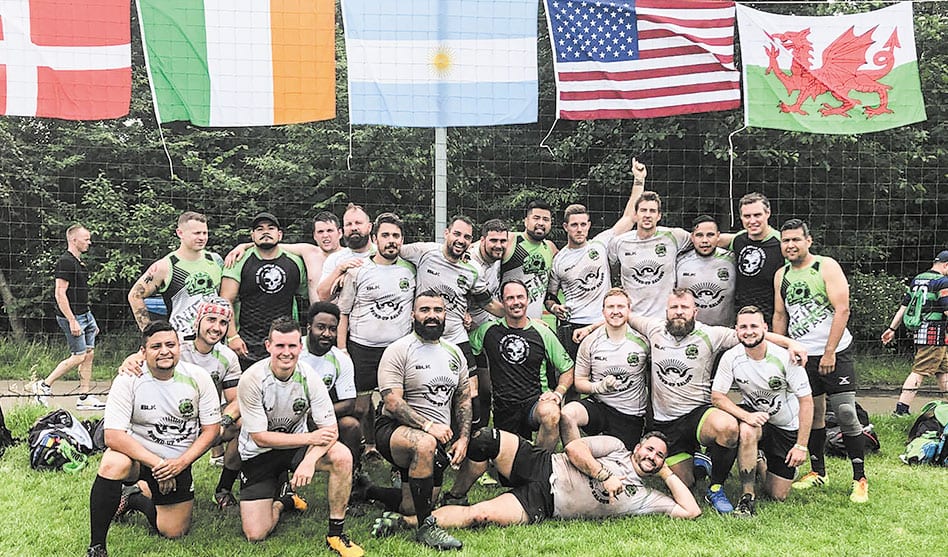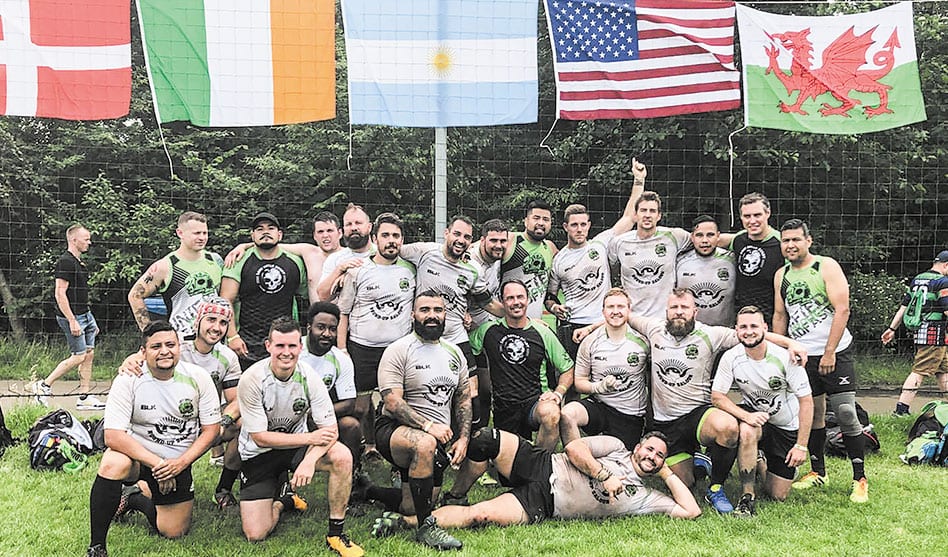Team members hoist Coach Todd Maria on their shoulders as they celebrate their Hoagland Cup victory. (Photos courtesy Todd Maria)
Dallas team is first to repeat winning its division in Mark Bingham Cup
DAVID TAFFET | Senior Sports Writer
taffet@dallasvoice.com
Lost Souls Rugby won the Hoagland Cup in Tier 2 competition at the Mark Bingham Cup, held in Amsterdam on June 7-10, and was honored with an award from Dallas City Councilman Adam Medrano. In three days of competition, the team won five of the six games they played.
The Bingham Cup, established in 2002, was named after amateur rugby player Mark Bingham, a gay man who is credited as one of the heroes of Flight 83, the United Airlines plane taken over by terrorists on Sept. 11, 2001 who intended to crash the plane into the Capitol just as others that day crashed American Airlines flights into the World Trade Center in New York and Pentigon near D.C. When Bingham and others on Flight 93 realized the terrorists’ plan, they fought to take control of the plane, forcing it to crash into an empty field in Pennsylvania instead of allowing it to reach the Pentagon.
 The Hoagland Cup is named for Bingham’s mother, Alice Hoagland, who attended the games this year.
The Hoagland Cup is named for Bingham’s mother, Alice Hoagland, who attended the games this year.
The gay Dallas rugby team was founded six years ago and is coached by Todd Maria. They flew to Amsterdam planning to defend their 2016 Tier 3 championship title, but were upgraded to Tier 2 competition before their first match.
According to Maria, this is the first time a team has won its division in two consecutive competitions.
Lost Souls lost its first game to Birmingham Bull before winning the rest of their matches and the division championship. The Birmingham Bull moved up to Tier 1 and won the Bingham Vase, placing No. 17 out of 25 in its division.
Of Lost Souls’ six matches, five were against teams from Europe, where rugby is more commonly played and more popular with fans.
Team member A.J. Tello said Lost Souls doesn’t belong to a league in Texas. “We do ‘friendlies,’” he said. Those are games arranged individually with other teams rather than organized by a league.
Tello credited Lost Souls’ success to their coach, Maria, complimenting his coaching ability, technique and strategy.
Maria explained that he prefers rugby to the similar game of American football because rugby is continuous play and faster-paced. There are no time outs. But beyond that, he said rugby is a more inclusive sport.
“It welcomes anyone regardless of skill set, body type, athletic ability,” Maria said. “There is a spot for all on a rugby pitch.”
Tello agreed, pointing out that one of his teammates is in his 50s.
“The sport teaches you teamwork, and in the process, you build lasting friendships,” Maria said.
Rugby and football both developed in the late 1800s from the same game.
A rugby match is broken down into two 40-minute halves with a 10-minute break. Each team has 15 players with seven substitutes. The Bingham Cup matches consisted of two 20-minute halves with one five-minute half time. The final matches in each division were two 25-minute halves.
Each team was allowed 25 players on the roster.
A rugby pitch is similar in size to a football field, although the rugby field is about 10 yards longer — the difference between 100 yards and 100 meters — and about 15 yards wider.
The team with the ball must move the ball up the field, but can’t pass it forward. They can only run or kick the ball forward. The opposing team stops them by tackling.
“A scrum is like a face-off in hockey,” Maria said. “Eight players form a massive formation to move the ball.”
To score, the rugby player has to do more than cross the goal line. The ball must be “touched down” to the ground to score a try, worth five points. A field goal, that is drop kicked, is worth one point. The extra point in football is called a conversion in rugby and is worth two points.
In rugby, there’s no offense or defense team — everybody plays both roles. A limited number of exchanges of players is allowed during the game.
If all the exchanges are used up and a player is injured, that team just has to play short.
The team with the ball can be tackled six times before turning over possession to the other team.
While the ball can’t be passed forward, it may be passed backward and remains in play even if the ball’s not caught.
After the team returned to Dallas with a world championship, Dallas City Councilman Adam Medrano presented Lost Souls with the Mayor’s
LGBT Task Force community award, recognizing them for the number of community service projects the team did during the year in addition to the Hoagland Cup win.











